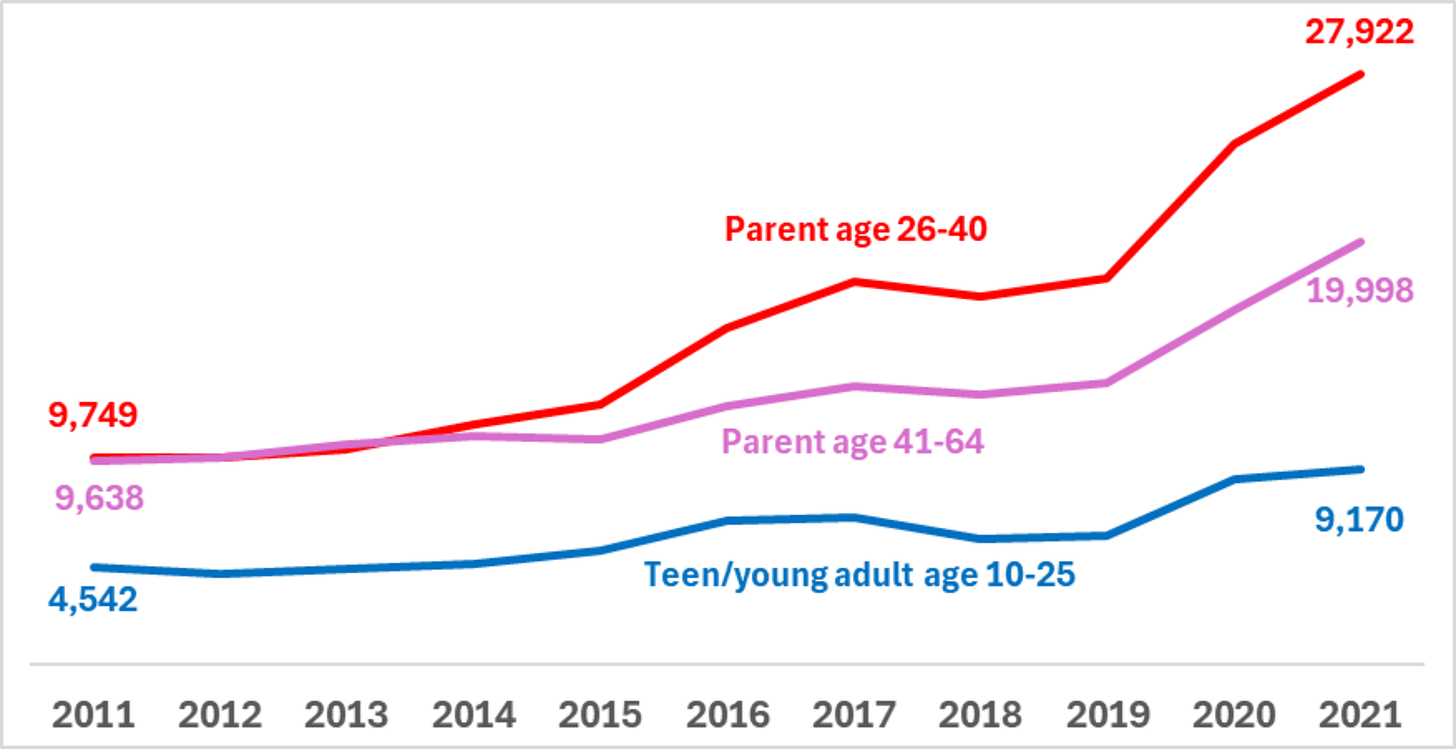A new study delineates parents’ widespread, soaring drug-abuse from 2011-2021 – exactly the period teens’ depression rose
More parents died from drug o.d.’s than the entire population of Cincinnati. Yet the Surgeon General et al insist teens’ mental health crisis is just social media.
Figure 1. Drug overdose deaths, parents by age, and teens/young adults, 2011-21. Sources: JAMA Psychiatry 5/8/2024; CDC 2024.
From 2011 to 2021 – exactly the same period that teenagers’ depression rose – the numbers of parents ages 26-64 (including nearly all parents of teenagers and young adults) dying from illicit-drug overdoses soared from 19,387 to 47,920 per year, a new study in JAMA Psychiatry reports.
Overall, 314,589 parents age 26-64 died from drug overdoses during that 11-year period – equal to the entire population of Cincinnati, Ohio, gone. That doesn’t include parental deaths from non-drug suicides, parents’ non-lethal drug/alcohol abuse, and drug and suicide deaths among relatives, teachers, and other grownups affecting young people.
“Premature death of a parent has complex effects on a child’s mental and physical health,” including “increased risks of substance use disorder and suicide,” JAMA authors laconically sum up decades of research.
Yet, Surgeon General Vivek Murtha and America’s leading mental health authorities are silent on parents’ skyrocketing drug abuse epidemic. Dead and drug-debilitated parents couldn’t possibly have anything to do with teens’ depression during the 2010s, all tacitly insist. It’s a taboo topic.
No; the crisis troubling teens is just Facebook, Instagram, TikTok, and smartphones, major interests and a literal frenzy of media stories declare. Social-media-blaming psychologists Jean Twenge’s and Jonathan Haidt’s books totaling 900 pages do not mention adult abuses or addiction, nor do Murtha’s reports or statements.
Nor do the hundreds of now largely irrelevant studies and surveys and thousands of commentaries on social media and teen mental health. The closest any come is the Centers for Disease Control’s massive 2021 Adolescent Behaviors and Experiences Survey, which made an unequivocal finding: parental and grownup abuses were by far the biggest factor driving teens’ poor mental health and other risks, more important than all other factors combined – including 13 times more important than screen time.
Suddenly, that became a taboo topic as well. The official position is that 14% of teens reporting violent abuses, 55% reporting emotional abuses, and mammoth increases in parent-age self-destruction to unheard-of peaks are effectively banished from discussion. Meanwhile, established interests blame social media and smartphones – a trivial factor associated with 1% to 3% of teens’ depression and not at all with teen suicide attempts and self-harm – to such a stifling national panic that far more important issues are crowded out.
Why are the huge issues of parental addiction and abuse driving major teenage troubles a forbidden from mainstream discussion? A disturbing answer will be proposed in a few days.

Figure 1. Drug overdose deaths, parents by age, and teens/young adults, 2011-21. Sources: JAMA Psychiatry 5/8/2024; CDC 2024.
From 2011 to 2021 – exactly the same period that teenagers’ depression rose – the numbers of parents ages 26-64 (including nearly all parents of teenagers and young adults) dying from illicit-drug overdoses soared from 19,387 to 47,920 per year, a new study in JAMA Psychiatry reports.
Overall, 314,589 parents age 26-64 died from drug overdoses during that 11-year period – equal to the entire population of Cincinnati, Ohio, gone. That doesn’t include parental deaths from non-drug suicides, parents’ non-lethal drug/alcohol abuse, and drug and suicide deaths among relatives, teachers, and other grownups affecting young people.
“Premature death of a parent has complex effects on a child’s mental and physical health,” including “increased risks of substance use disorder and suicide,” JAMA authors laconically sum up decades of research.
Yet, Surgeon General Vivek Murtha and America’s leading mental health authorities are silent on parents’ skyrocketing drug abuse epidemic. Dead and drug-debilitated parents couldn’t possibly have anything to do with teens’ depression during the 2010s, all tacitly insist. It’s a taboo topic.
No; the crisis troubling teens is just Facebook, Instagram, TikTok, and smartphones, major interests and a literal frenzy of media stories declare. Social-media-blaming psychologists Jean Twenge’s and Jonathan Haidt’s books totaling 900 pages do not mention adult abuses or addiction, nor do Murtha’s reports or statements.
Nor do the hundreds of now-irrelevant studies and surveys and thousands of commentaries on social media and teen mental health. The closest any come is the Centers for Disease Control’s massive 2021 Adolescent Behaviors and Experiences Survey, which made an unequivocal finding: parental and grownup abuses were by far the biggest factor driving teens’ poor mental health and other risks, more important than all other factors combined – including 13 times more important than screen time.
Suddenly, that became a taboo topic as well. The official position is that 14% of teens reporting violent abuses, 55% reporting emotional abuses, and mammoth increases in parent-age self-destruction to unheard-of peaks are effectively banished from discussion. Meanwhile, established interests boost social media and smartphones – a trivial factor associated with 1% to 3% of teens’ depression and not at all with teen suicide attempts and self-harm – to such a stifling national panic that far more important issues are crowded out.
Why are the huge issues of parental addiction and abuse driving major teenage troubles a forbidden from mainstream discussion? The disturbing answer will be proposed in a few days.





And another one on After Babel too:
https://www.afterbabel.com/p/keeping-our-kids-safe-online
They keep on moving the goalposts!
Behold, the biggest (and pinkest) elephant in the room.